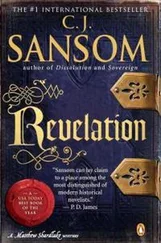‘How do you know these details?’
‘From the apprentice, but mainly from his neighbour, who owns a larger print-shop next door. Geoffrey Okedene. At around nine, Master Okedene was closing down his shop when he heard a great commotion, shouts and cries for help, from Greening’s shed. He was a friend of Greening’s and went to investigate. The door was locked, but it was a flimsy thing; he put his shoulder to it and broke it open. He caught a glimpse of two men running through the other door, at the side – these print-shops get so hot, and full of vile smells from the ink and other concoctions they use, that even small ones have two doors. Master Okedene did not pursue them, for an attempt had been made to set Greening’s print-shop on fire. His stock of paper had been strewn around and set light to. Okedene was able to stamp it out – you may imagine that if such a place caught it would burn like a torch.’
‘Yes.’ I had seen these poorly erected wooden sheds that were built against the cathedral walls or in vacant plots nearby, and heard the loud rhythmic thumping that constantly resounded from them.
‘Only when he had put out the fire did Okedene see poor Greening lying on the earthen floor, his head beaten in. And, clutched in Greening’s hand, this …’ Lord Parr reached into a pocket in his robe and carefully extracted a small strip of expensive paper covered in neat writing and dotted with the brown stains of dried blood. He passed it to me. I read:
The Lamentation of a Sinner, Made by Queen Catherine, Bewailing the Ignorance of her Blind Life.
Most gentle and Christian reader, if matters should be rather confirmed by their reporters than the reports warranted by the matters, I must justly bewail our time, wherein evil deeds be well worded, and good acts evil turned. But since truth is, that things be not good for their praises, but praised for their goodness, I do not…
There the page ended, torn off. I looked at the Queen. ‘This is your writing?’
She nodded. ‘That is the opening of my book. Lamentation of a Sinner .’
Lord Parr said, ‘Okedene read it and of course grasped its import from the heading. By God’s mercy he is a good reformer. He brought it personally to the palace and arranged for it to be delivered into my hands. I interviewed him at once. Only then did he call the coroner. He has told him all he saw, except, at my instruction, about this piece of paper. Fortunately, the coroner is a sympathizer with reform, and has promised that if anything comes to light he will inform me. And he has been very well paid,’ he added bluntly. ‘With the promise of more to come.’
The Queen spoke then, an edge of desperation in her voice, ‘But he has discovered nothing, nothing. And so I suggested we come to you, Matthew. You are the only one whom I know outside the court who could carry out such an investigation. But only if you will. I know the terrible dangers –’
‘He has promised,’ Lord Parr said.
I nodded. ‘I have.’
‘Then I thank you, Matthew, from the bottom of my heart.’
I looked at the torn paper. ‘The obvious conclusion is that Greening was trying to keep the manuscript from the intruders, and whoever killed him snatched it out of his hands, but part of the top page tore away.’
‘Yes,’ said Lord Parr. ‘And whoever killed him heard Master Okedene breaking down the door and fled. So desperate were they to avoid identification that they did not even pause to prise the piece of paper from the dead man’s hands.’
‘Or did not notice it at the time, more likely,’ I said.
Lord Parr nodded. ‘You should know that this was not the first attempt on Greening’s life. He lived as well as worked in that hovel, in the most wretched poverty.’ He wrinkled his nose in aristocratic distaste. ‘As I mentioned, he has a young apprentice. Five days before, this boy arrived for work early in the morning and found two men trying to break into the shed. He called the alarm and they fled. From the apprentice’s account they were different men from those who attacked and killed Greening shortly after.’
Cranmer said, ‘Our first thought was that Greening had the manuscript given to him for printing. But that makes no sense. A Catholic might print it, so the book could be distributed around the streets, to the Queen’s ruin, but no reformer.’
‘Yes.’ I considered. ‘Surely if it fell into Greening’s hands and his views were as you say, he would do exactly what Okedene did, return it. Could Greening have been a secret Catholic?’
Cranmer shook his head. ‘I have had discreet enquiries made. Greening was a radical, a known man, all his life. And his parents before him.’ He gave me a meaningful look.
A ‘known man’. That meant Greening’s family belonged to the old English sect of Lollardy. Over a hundred years before Luther, the Lollards had come to similar conclusions about the centrality of the Bible in the cause of salvation, and were known for their radical views about the Mass. Many of them had gravitated to the most extreme edges of Protestantism; with their long history of persecution, they had experience of being an underground community. They were as unlikely as any radicals to wish the Queen harm.
I asked, ‘Is there anything else in the document that could identify it as the Queen’s work?’
‘It is all in the Queen’s hand.’
‘But the work as a whole would not be instantly identifiable, like that opening passage?’
‘Even a superficial reading would identify the author.’ Lord Parr looked at the Queen. ‘It is, after all, a personal confession of sinfulness and salvation. It is obviously the Queen’s work.’ He shook his head. ‘But we have no idea who has it now, or how it came into Greening’s possession. The inquest was held two days ago; it returned a verdict of murder by persons unknown.’
The Queen looked at me. ‘We have been waiting like rabbits caught in a snare for something to happen, for the book to appear on the streets, but there has been nothing for eleven days save silence. We three have fretted day and night over what to do and decided the matter must be investigated, and not by someone closely associated with the court.’ She held my gaze, her eyes full of appeal. ‘And so Matthew, forgive me, my mind turned to you. But even now, I say again, I only ask if you will help me. I do not command; I will not. I have enough blood on my hands through my writing of that book; but for me, poor Greening would still be alive.’ She added sadly, ‘I meant only to do good, but truly the Bible says, “Vanity of vanities, all is vanity.”’ She sat back, exhausted.
I said – could only say, ‘How would you have me proceed?’
Cranmer and Lord Parr exchanged a glance. Relief? Hope?
Doubt as to the wisdom of placing this thing in my hands? Lord Parr stood abruptly and began pacing the room. ‘We have a plan, though you must tell us if you see flaws in it. The matter is urgent and I think must be approached from both ends. So far as Greening’s murder is concerned, agents of the Archbishop have spoken with his parents through their vicar. They know nothing of the book, of course, but want the murderer found. They live in the Chilterns, so cannot easily come to London.’
‘The Chilterns, yes.’ I knew the district had long been known for Lollardy.
‘They have willingly given you a power of attorney on their behalf. So far as they are concerned, wealthy friends of their son wish to discover his murderer, nothing more. Now the inquest is over, investigations have been left in the hands of the local constable, a man called Fletcher, a plodder. You will know, Serjeant, that if a murderer is not found within forty-eight hours the constables lose interest, as the chances of finding the perpetrator are slim. I should think Fletcher will be glad if you take over the work from him. Speak to Greening’s apprentice, his neighbours, his associates; look round the workshop. But say nothing about the book. Except to Okedene, who, thank God, is a man who knows how to keep his mouth shut. He is utterly loyal to reform and understands the importance of this.’ Lord Parr looked at me with steely intensity.
Читать дальше
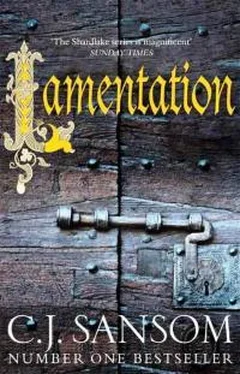
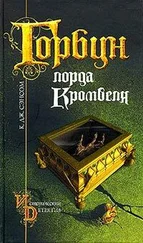
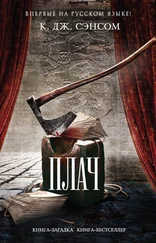




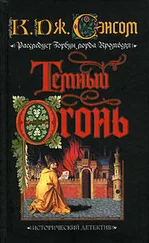
![К Сэнсом - Стенание [другой перевод]](/books/432043/k-sensom-stenanie-drugoj-perevod-thumb.webp)
